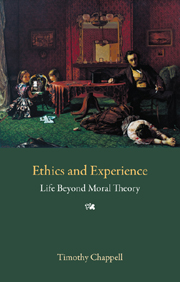Book contents
- Frontmatter
- Contents
- Acknowledgements
- 1 The turn to reason: how human beings got ethical
- 2 Demarcation: what does “ethical” mean?
- 3 Motivation: why be moral?
- 4 Deliberation: the question of reason
- 5 Introducing subjectivism and objectivism
- 6 Five arguments for ethical subjectivism
- 7 The content of ethics: expressivism, error theory, objectivism again
- 8 Virtue ethics
- 9 Utilitarianism
- 10 Kantianism and contractarianism
- 11 Theory and insight in ethics
- Further reading
- Bibliography
- Index
1 - The turn to reason: how human beings got ethical
- Frontmatter
- Contents
- Acknowledgements
- 1 The turn to reason: how human beings got ethical
- 2 Demarcation: what does “ethical” mean?
- 3 Motivation: why be moral?
- 4 Deliberation: the question of reason
- 5 Introducing subjectivism and objectivism
- 6 Five arguments for ethical subjectivism
- 7 The content of ethics: expressivism, error theory, objectivism again
- 8 Virtue ethics
- 9 Utilitarianism
- 10 Kantianism and contractarianism
- 11 Theory and insight in ethics
- Further reading
- Bibliography
- Index
Summary
The History of every major Galactic Civilization tends to pass through three distinct and recognizable phases, those of Survival, Inquiry and Sophistication, otherwise known as the How, Why, and Where phases … the first phase is characterized by the question “How can we eat?”, the second by the question “Why do we eat?” and the third by the question, “Where shall we have lunch?”
(Douglas Adams, The Hitchhiker's Guide to the Galaxy, 1979: 159)Our argument is not about just any chance question; it is about the question how life should be lived.
(Plato, Republic 352d7–8)Long ago, human beings discovered that they could resolve specific technical questions – “How can I catch food?”, “How can I keep warm in my cave at night?”, “How can I avoid becoming food?” – by applying reason. They found they could answer these questions by thinking them through carefully, by generating and criticizing possible solutions, by trying out those solutions in practice and then refining them, and by remaining on the lookout for better solutions even when a given problem already had a passable solution.
We may call this discovery the turn to reason. It was a revolutionary move when it happened. The method of solving problems by applying reason to them quickly became a very successful competitor with older approaches such as brute force, or guesswork, or doing the first thing that comes into your head, or consulting the Juju, or copying others, or mindless repetition of past practice no matter how unsuccessful.
- Type
- Chapter
- Information
- Ethics and ExperienceLife Beyond Moral Theory, pp. 1 - 4Publisher: Acumen PublishingPrint publication year: 2009



